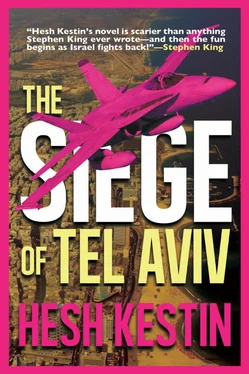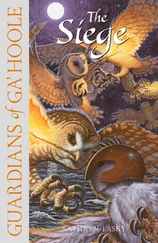“My mother grew up in Alexandria. She taught me.”
“Just so. This is why we call it mother tongue. In speech the child emulates her who gave him life.”
Alex cannot suppress the smile. “Sometimes not only in speech.” The barber smiles as well. “I can spare five gallons.”
ON THE SCREEN BEHIND Damian Smith, Muslims and Jews clash at UN Plaza, a wedge of mounted New York police forcing them apart as the newscaster reads from his teleprompter. “Earlier today, a march down New York’s Fifth Avenue to the UN by pro-Israel demonstrators culminated in violence with a counter-demonstration by Muslims and their sympathizers. Police reported seven injured before order was restored.”
The screen goes to Connie Blunt aboard CV Star of Bethlehem with a tall sixty-year-old in a khaki officer’s hat, black t-shirt, and jeans. He is smoking a cigar.
“Meanwhile, some five thousand miles away, Connie Blunt joins us aboard the Christian Vessel Star of Bethlehem , en route to Tel Aviv and possible interception by the Egyptian Navy. Connie, tell us what morale is like aboard the flotilla.”
The sound of “Amazing Grace” rises and then is reduced by the control room so that Blunt can be heard.
“Damian, moments ago spontaneous hymn singing broke out here aboard the CV Star of Bethlehem , and I’m told it’s spread to the other ships. It’s hard to believe the Egyptian Navy will make good on its threats, but there’s no knowing. The crew has been doing lifeboat drills since we left Marseilles.”
“Connie, how long before you enter Israeli waters—or Islamic waters, as they’re now called?”
“Damian, that’s a very good question. Here with me on the Star of Bethlehem is its captain, retired US Navy Commander Franklin D. Levine, known aboard as Captain Frank. Captain Frank, are we sailing into danger?”
“Well, Connie,” the captain says in a voice heavy with command gravel. “Your people probably know more than we do about that. All I do know is that we’ve been told the Egyptian Navy has warned they’ll fire on us if we enter Israeli waters.”
“I believe they’re calling it Islamic waters now.”
“They can call it dog (bleep) for all I care,” the captain says. “We’re on course for Israel, not some other place.”
“Are you questioning the outcome of the war, captain? It seems to be well accepted, at least among the diplomatic commu—”
“You know the story of Abe Lincoln and the farmer?”
“Abe Lincoln?”
“Yeah, used to be president, and a better one than we got now. Abe asks the farmer, ‘How many legs has a cow?’ The farmer says, ‘Why, four.’ Abe says, ‘Well, if we call her tail a leg, then how many?’ The farmer says, ‘Five.’ ‘No, sir,’ Ol’ Abe says. ‘Just calling the tail a leg don’t make it one.’ This ship and the five in our wake are bound for Tel Aviv, Israel . Far as I can see, the Arabs can shove any other name for the Jewish State up their (bleep).”
“Be that as it may, captain, the Egyptian Navy seems to disagree. Will they fire on us, do you think?”
Captain Frank is not doing a very good job of concealing his impatience. His tanned face creases unpleasantly. “That’s not known at this time.”
“Captain, when will we know?”
The creases deepen. “When will we know if the Egyptian Navy is going to fire on us?”
“Yes, when?”
Captain Frank looks up to the cloudless sky, as if seeking divine aid in dealing with this idiot. “About a second after they do.”
Blunt is oblivious. “And when do you suppose we’ll be crossing from international waters into formerly Israeli, now Islamic, waters?”
“Miss, you see that green stuff?”
Blunt shades her eyes to follow his finger.
“The wet stuff,” Captain Frank says.
“The ocean?”
“Yeah, the Mediterranean Sea. Do you happen to see any lines out there, with markers and flags? Any buoys?”
“No.”
“That’s because there aren’t any.”
“Captain, I’m not sure I understand.”
“When the shooting starts—that’s when we crossed the line. That’s when we know.”
“Yes, but can you—”
“From our position and from what I’m informed of theirs, and assuming they’re making twenty knots, two hours.”
“Thank you, Captain Franklin D. Levine, commander of the six vessels that make up this aid flotilla on course for Tel Aviv. This is Connie Blunt, aboard the Christian Vessel Star of Bethlehem , somewhere in the Mediterranean.”
“Thank you, Connie. And this is as good a time as any to tell our viewers CNN offered to evacuate Connie, producer Terry Santiago, and cameraman Buddy Walsh by helicopter. Each refused. Stay safe, gang!”
IN THE READY ROOM of US Marine Aviation Forward Attack Squadron Wildcat, the three pilots turn to each other as Jimbo, who as ranking pilot has charge of the remote, clicks off the TV. They are all in regulation flight suits that allow pilots of supersonic planes to withstand up to nine G’s without passing out. The tight-fitting trousers prevent blood from pooling in the lower body, thus preventing it from draining from the brain. Unless they are about to fly, no pilot will wear them. The discomfort is considerable. Each suit weighs fourteen pounds.
Chris has an aeronautical map in front of him. “Two hours.”
“Guys,” Stan says. “You don’t have to do this.”
“Shee-it, everybody knows you Jews got no sense of direction. You people done wandered in the desert forty years. We wouldn’t want you to get lost out there all on your own, would we now?” Chris folds the map.
“Hell, no,” Jimbo says. “We sure as hell wouldn’t want that.”
ON A MOUNTAIN PATH west of Jerusalem, the two donkeys descend steadily. The shortcut takes their riders, both dressed in soiled Bedouin robes, from the secondary road where they were passed twice by an olive-green Cadillac flying the pennant of Egyptian headquarters staff to this narrow trail enfiladed by thick-trunked olive trees that bore fruit before the time of Jesus.
“Abed,” Cobi says, “my tuchis is about to fall off.”
“Why not let the donkey ride you?”
“Is this your idea of transportation, man? It’s the twenty-first century.”
“As it happens,” Abed says, “I possess a Ford pickup, four-wheel drive, AC. Beautiful machine. Despite Hollywood movies, the Bedouin is no enemy of the internal combustion engine.”
“So why in hell do we have to—”
“Because that vehicle is too big to negotiate this pathway. On better roads, we would be stopped, and questioned, and perhaps the Ford would be requisitioned. The Syrian sons of whores at the bottom, hidden in the foliage, they won’t bother stealing two donkeys.”
Cobi shades his eyes. “I don’t see any Syrians.”
Abed points to the rocky trail before them. “We’ve been following their tracks for two kilometers. Army officer, eh? Don’t they teach you anything?”
GHETTO TEL AVIV COVERS fourteen square miles. Far larger than the municipal boundaries of Tel Aviv proper, this takes in Bat Yam to the south, parts of Herzlia to the north, and to the east is bounded by the Geha Road, whose six empty lanes prove as much a natural barrier as any river. To the west is the Mediterranean Sea. The area contains six hundred schools, three universities, and so many eating places—from falafel stands to sidewalk cafés to elegant restaurants—that even the municipal licensing authorities, when they functioned, were unsure of the precise number. At any given time, eight hundred buses ran on its streets, not including several hundred sheroot jitneys that followed bus routes and were authorized to stop anywhere along the way to pick up and discharge passengers.
Читать дальше












